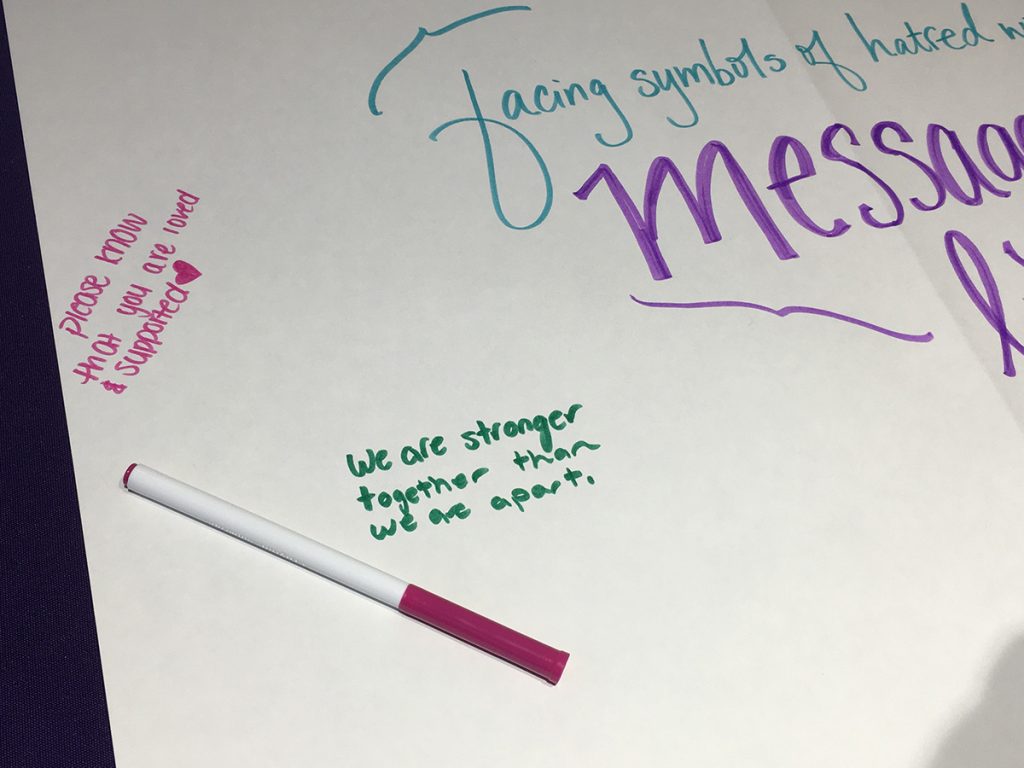Emerson Comes Together Following Anti-Semitic Graffiti Incident

By Erin Clossey
Members of the Emerson community gathered in the Reflection Room of 172 Tremont Street to show solidarity and support one day after swastikas were found scrawled in a campus stairwell.
The standing-room-only vigil, led by the Rev. Julie Avis Rogers, campus chaplain, and Jake Freedman, advisor to the Emerson Jewish community, invited participants to share their reflections on the act of hate. Speakers included President Lee Pelton; Melissa Bordelon ’21, president of Emerson Hillel; Director of Intercultural Student Affairs tamia jordan; Kristelle Angeli, Catholic chaplain for the campus; and students and faculty who shared their thoughts on being Jewish in a world where anti-Semitism is still a fact of life.
“Hate is hate. Today, it’s an anti-Semitic act and tomorrow it’ll be against another group, and so it’s great to see such a great turnout,” Marketing Communication affiliated faculty member Sharon Topper said after the vigil at which she read the Martin Niemöller poem, “First they came…”
“As someone said, it’s just a scribbling on a wall, but the intent is hate.”
President Pelton, who sent an email to the community soon after the graffiti was found, condemning the incident as “indefensibly abhorrent,” shared a letter he received from a friend who praised the overall strength and compassion of the message, but took issue with a line that called the swastika a symbol used to “mobilize violence against Jews and millions of other marginalized people.”
Violence, Pelton said the friend told him, is maybe “too weak and vague” to describe what the symbol actually represents. Genocide or Holocaust would have been stronger options, she said.
“She’s absolutely right,” Pelton said, lighting a flameless candle in the name of “truth.” “Genocide … would have been a more accurate, more powerful, more truthful way to express
[what the swastika symbolizes]
.”
Oriana Timsit, a second-year student who works with Avis Rogers in the Center for Spiritual Life and spoke at the vigil, said afterward that growing up in France, she was accustomed to seeing anti-Semitism, but didn’t expect to find it in so blatant a form at Emerson.
“I just feel really sad about what happened,” Timsit said. “But I was also really happy that there was a space to come to kind of think and grieve over it, and I actually feel a lot better.”
Dean of Campus Life Jim Hoppe called incidents like the graffiti “cowardly ways to try to send a message that someone is not … welcome.”
“We have to recommit ourselves to make sure that there’s no question that everyone’s welcome, and that we’re not going to allow this,” Hoppe said, “and if we’ve done anything to let people think it would pass by unnoticed, then we have the responsibility to step up and remove that doubt.”
On Friday, January 24, 6:00 pm, Emerson Hillel is hosting a Solidarity Shabbat in the Private Dining Room, to “celebrate Judaism in the face of hate.” The shabbat is open to all Emerson community members, whether or not they identify as Jewish.
Categories